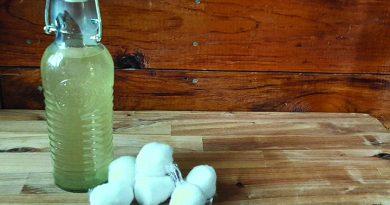How To Have A Holistic Medicine Cabinet
By Marina Sylverio, RHN
I’ve recently experienced a series of events exposing me to bacteria, poison, and virus; it started with an ache in my ear and throat from exposure to bacteria, so I took care of that with natural remedies and it was gone in about two weeks. Then I went up north and was swimming when I got attached by black flies from the neck up; my lymph nodes were painfully swollen from all the poison of their sting. Although I was eventually able to get that under control, my immune system was now weak and I ended up with a chest infection.
The good news is, I’m completely recovered and luckily without the need of any medication, not even over-the-counter (OTC) drugs. This made me think about what we keep in our medicine cabinet. Are the contents really helping us or hurting us? Below are some common remedies that most people reach for when they are not well, and their affect in the short and long term, as well as alternatives.
NSAIDs (nonsteroidal anti-inflammatory drugs)
NSAIDs such as analgesic (pain killing), antipyretic (fever reducing) drugs, or stronger prescription opiates (narcotics) are used for pain. I’m not suggesting that if one is in a lot of pain, not to take any of those, but be aware of side effects and understand that those medications just block the pain, they don’t get rid of the cause.
Those drugs damage the intestinal lining and cause dysbiosis (imbalance of intestinal flora which means there’s not enough beneficial bacteria, and overgrowth of bad bacteria). I feel it’s best to avoid those drugs as much as possible, but if you absolutely have to have them, then take probiotics to balance the intestinal flora and help protect your intestinal health. Opiates (narcotics) have even more severe side effects.
Those of you who are long-term users of those type of drugs, you may be rejecting this information and thinking I don’t understand your pain. I really empathize with people in pain and understand it well. I’ve had 10 surgeries, including orthopedic surgery, and several broken bones. I usually don’t take any pharmaceutical drugs for pain, and if I have to, it’s just for a day or two at most.
Last year however, I fell and broke my pelvis in two places and that pain outranked any past pain I’ve ever had. I was literally flat on my back unable to move for weeks. I was prescribed morphine (one of the most powerful opiates) and it was not even taking the edge off the pain. The pain lasted for months.
I could feel and was very aware of the side effects the morphine was having on my body, so I tried to manage with a minimal dose and stopped after three weeks (but I still experienced difficult withdrawal symptoms). I continued to take my cocktail of natural remedies to manage my pain and reduce inflammation.
Natural remedies for inflammation
Quercetin, curcumin, fish oil and ribes nigrum (black current) tincture; homeopathic remedies: arnica pellets and topical cream; also I always take a product for chronic joint pain that contains NEM (natural eggshell membrane). This help increase the body’s production of glucosamine and rebuild joints. Plus to help the healing process, I also took higher dose vitamins C and D.
Antacids
Antacids are another common medication or prescription PPIs (Proton Pump Inhibitors) to reduce or block stomach acid. It’s important to understand that that long term use of those drugs may lead to B12 deficiency because HCl (hydrochloric acid in the stomach) is needed for the production of B12.
Low HCl causes malabsorption of nutrients especially protein, which can lead to increased digestive issues and possible food intolerance. I understand that severe GERD (gastroesophageal reflux disease), can lead to painful ulcers and these conditions are often treated with PPIs, but keep in mind that those drugs completely block the production of HCl and HCl is needed to break down protein into single amino acids that are the building blocks for the protein in our body.
Those amino acids are needed for making immune cells to ward off disease, enzymes which are catalysts for every chemical reaction in our body, neurotransmitters which are part of the body’s communication system, also our organs, skin, hair, and much more are all made of protein.
In the case of acid reflux and GERD, good alternatives to keep in your holistic medicine cabinet are aloe vera or DGL (deglycyrrhizinated licorice), those can help neutralize acid, reduce inflammation, and heal ulcerations and damage caused from GERD; they can be taken away from meals as to not reduce HCl during meals for better digestion. It’s also a good idea to keep broad spectrum digestive enzymes handy to help improve digestion during meals.
Antiemetic drugs (for nausea and vomiting)
The most common OTC antiemetic drugs have an ingredient list of many toxic chemicals, including titanium dioxide, talc, and even “Yellow No. 6” food colouring which has been shown to cause cancer, ADHD, hyperactivity, and allergic reactions.
The CSPI (Centre for Science in the Public Interest) said this food dye causes many health risks and is summoning the FDA to ban Yellow No. 6 specifically. If you experience nausea and vomiting, try making some ginger tea; also smelling peppermint or lemon essential oil can help relieve nausea.
Antihistamines (drugs for allergies)
Their side effects include drowsiness, dizziness, impaired thinking, dry mouth, difficulty urinating, constipation, blurred vision, insomnia, night mares, hallucinations, rapid heart rate, and more.
Those group of drugs are of course necessary in the case of anaphylactic reactions, but for common seasonal allergies or pet allergies you might want to try some natural options like: quercetin (long term for optimal effect), high dose vitamin C, nettle, bromelain, butterbur, black cumin seed, elderberry, raw honey, and for sinus congestion, you can try nasal irrigation with a mild Himalayan salt solution.
Mineral oil and petroleum jelly
Those are petrochemical products derived from crude oil and natural gas. Petrochemicals and their by-products such as dioxin are known to be hormone disrupters and carcinogens and can cause many health problems. There are many wonderful natural alternatives for healing and moisturizing such as coconut oil, rosehip oil, almond oil, jojoba oil, shea butter, and coco butter just to name a few.
A strong immune system is the key to warding off bacteria, viruses, and all kinds of diseases; bee propolis or royal jelly can support the immune system and reduce reactions from seasonal allergies. Our gut health, specifically intestinal flora and the microbiome are the primary foundation for a strong immune system.
There are many factors that disrupt the microbiome, weakening our immune system resulting in susceptibility to infections and disease. Prescription drugs, especially antibiotics kill off good bacteria causing dysbiosis. It’s optimal to replenish good bacteria by incorporating probiotics, fermented foods, prebiotic foods in our diet, and trying to avoid antibiotics. It can be helpful to keep some natural anti-viral, anti-bacterial, and anti-fungal items in the medicine cabinet and examples of those are: garlic supplement (you can also incorporate lots of garlic in the diet), grapefruit seed oil, or oil of oregano.
Also Himalayan or sea salt solution in water can be used as a gargle. I would also like to note that coconut oil is one of my favorite things to have handy. In addition to being wonderful to cook with and tastes great, it has caprylic acid which is anti-fungal and can be used topically or orally.
Antiseptics for skin infections, irritation, wounds
Here is a list of suggestions you might find helpful: tea tree oil, witch hazel, vitamin E oil, raw honey, or as mentioned above, the Himalayan or sea salt solution can all be good alternative antiseptic remedies.
The body is infinitely complex and no individual can fully comprehend its intricacy. Some medications often work by blocking or suppressing chemical pathways and interfering with the natural flow of the body’s metabolism. I feel it’s better to help support our body by giving it what it needs and trust this incredibly intelligent system to do its marvels.
Marina Silverio is a Registered Holistic Nutritionist (RHN) and a member in good standing with CAHN-Pro. She has a private practice in Toronto. nutrition@marinaRHN.ca




